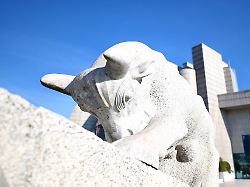Erdogan helps
The Turkish stock market is booming after the quake
By Max Borowski
02/20/2023, 2:07 p.m
After the devastating earthquake, prices plummet, then the Turkish stock exchange is closed for a week. After the reopening, prices skyrocket. This is due less to investor confidence in the strength of the Turkish market and more to short-term government action.
Almost two weeks after the earthquake in Turkey and neighboring Syria, the extent of the damage is only gradually becoming comprehensible. More than 41,000 dead have been counted in Turkey alone, but thousands of victims are believed to be buried under the rubble. It is not yet possible to take stock of the economic damage and long-term consequences. But in one place it seems as if the economy has already ticked off the catastrophe: the Turkish stock exchange is a perfect world. At least the share prices summarized in the leading index BIST100 are already well above the level before the earthquake.
Turkey’s leading index rose to more than 5150 points at times on Monday. In the first few days after the earthquake on February 6, the stock exchange barometer fell by around 15 percent. Then the stock exchange regulator suspended trading for a week. The plan to calm the market has worked. Since the stock market reopened last week, prices have shot up by a good 23 percent.
The Turkish stock market is thus building on the strength of the past year. Turkey, many of its companies and the stock exchange are among the winners of the first year of the war in Ukraine. On the one hand, exports are booming because the national currency, the lira, which has fallen sharply against the dollar and euro, makes Turkish products cheaper abroad. And on the other hand, because Turkey has become one of the most important suppliers for Russia, which is cut off from many trading partners due to Western sanctions.
At the same time, given the extremely high inflation, Turkish savers have few alternatives to invest their money. Despite high nominal interest rates, the real losses on bank accounts and fixed-income securities, i.e. after deducting the inflation rate, are high. Real estate prices have already skyrocketed so much that many can no longer afford to enter the market. The BIST100 had already fallen back somewhat from its peak at the beginning of the year before the earthquake. Since the start of the Russian invasion almost exactly a year ago, however, it has still more than doubled.
“Investors are not stupid”
However, the rally over the past few days is by no means based solely on investor confidence in the Turkish stock market. Rather, the government of President Recep Tayyip Erdogan made sure by decree that prices jumped up after trading reopened. At the beginning of the week, the authorities ordered private pension funds to significantly increase their investments in Turkish stocks. These funds receive government grants. They now have to invest at least 30 percent of them in the stock market instead of the previous 10 percent.
At the same time, several stock market heavyweights such as Turkish Airlines, Türk Telekom and Halkbank announced that they would buy their own shares. In addition, after the earthquake, the government had announced a temporary tax cut for such buyback programs. Turkey’s sovereign wealth fund has also reportedly launched a special program to buy shares with the aim of stabilizing prices during periods of sharp price volatility. He is to receive the money for this from state banks.
These measures have had the desired success, at least so far. “Investors are not stupid. They notice which way the wind is blowing,” quotes the “Financial Times” Murat Gülkan, head of the Istanbul-based consulting firm OMG Capital Advisors. The government measures are a signal. In anticipation of this money, there are only a few willing sellers on the stock exchange – at the moment. In the long term, however, the interventions could take revenge.
There are big doubts that the effect will last permanently. The government cannot maintain this type of support indefinitely. In order to stay at this high level, the stock market needs new purchases again and again, said Nick Stadtmiller, product manager at the analysis house Medley Global Advisors, to the finance portal “Bloomberg”. The authorities would have to continue their interventions permanently in order to prevent a collapse of the market.
